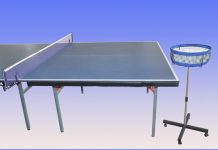Table tennis, a fast-paced and exhilarating sport, requires players to be in top form physically and mentally. With the intense demands of the game, it becomes crucial for table tennis players to fuel their bodies with the right diet. The diet for table tennis players should be balanced and focused on providing essential nutrients that enhance endurance, speed, and concentration. In this article, we will explore the key components of a table tennis player’s diet and discover the foods that can take their game to the next level. Table tennis is a fast-paced and physically demanding sport that requires quick reflexes, agility, and endurance. In order to perform at their best, table tennis players need to fuel their bodies with a well-balanced and nutrient-rich diet. Proper nutrition not only helps enhance their physical performance but also supports their overall health and well-being. In this article, we will discuss the nutritional requirements of table tennis players, including the caloric intake, importance of hydration, timing of meals and snacks, as well as the specific nutrients table tennis players should focus on.
Review contents
Nutritional requirements for table tennis players
Table tennis players, like athletes in other sports, have specific nutritional requirements that differ from those of the general population. Their intense physical activity levels require them to consume an adequate amount of nutrients to meet the demands of their training sessions and competitions. The key macronutrients that table tennis players should focus on are carbohydrates, proteins, and healthy fats. Additionally, they should ensure they are getting enough vitamins and minerals to support their overall health.
Caloric intake for table tennis players
The caloric intake for table tennis players will vary depending on several factors, including age, gender, weight, activity level, and training intensity. On average, male table tennis players require about 2,200 to 3,000 calories per day, while female players may need slightly fewer calories, ranging from 1,800 to 2,500 calories. It’s important to note that these are just general guidelines, and individual needs may vary. Consulting with a registered dietitian can help determine the specific caloric needs for each player.
Importance of hydration
Staying properly hydrated is crucial for table tennis players. Dehydration can negatively impact performance, leading to fatigue, muscle cramps, and reduced cognitive function. It’s recommended that table tennis players drink water throughout the day, aiming for a total fluid intake of about 2-3 liters. During intense training sessions or competitions, it’s important to replace fluids lost through sweat by consuming sports drinks or electrolyte-rich beverages. Remember to listen to your body and drink whenever you feel thirsty.
Timing of meals and snacks
The timing of meals and snacks plays a significant role in optimizing performance and fueling the body effectively. Table tennis players should aim to have regular meals and snacks spaced evenly throughout the day to maintain energy levels and prevent hunger. It’s recommended to have a balanced meal containing carbohydrates, proteins, and healthy fats about 2-3 hours before training or competition. This allows enough time for digestion and absorption, providing a steady source of energy. Additionally, having a small snack rich in carbohydrates and proteins about 30-60 minutes before playing can help top up energy stores and enhance performance.
Pre-match meals
The pre-match meal is a crucial opportunity to fuel the body for optimal performance. It should be balanced and provide a good source of energy without causing discomfort or digestive issues. A pre-match meal for table tennis players should consist of complex carbohydrates, such as whole grains, fruits, and vegetables, as well as a moderate amount of lean protein sources like chicken, fish, or tofu. It’s best to avoid high-fat and greasy foods, as they can slow digestion and cause discomfort during physical activity. Hydration is also essential, so be sure to drink fluids leading up to the match as well.
Post-match recovery meals
After a demanding table tennis match, the body needs to recover and replenish its energy stores. A post-match recovery meal should focus on carbohydrates and protein to help restore glycogen levels and initiate muscle repair and growth. Good options for post-match meals include a combination of whole grains or starchy vegetables, lean proteins, and a variety of vegetables or fruits. For example, a chicken stir-fry with brown rice and a side of steamed broccoli would provide a balance of carbohydrates, proteins, and essential nutrients. Remember to hydrate properly and drink fluids to replace any lost during the match.
Carbohydrates for energy
Carbohydrates are the primary source of energy for table tennis players. They provide the fuel needed for quick movements, explosive shots, and sustained endurance during matches. It’s important to consume complex carbohydrates, such as whole grains, fruits, and vegetables, as they provide a steady release of energy and contain valuable nutrients and fiber. Simple sugars, found in processed foods, should be limited as they can cause energy crashes and negatively impact performance.
Protein for muscle repair and growth
Protein is essential for muscle repair, growth, and recovery. Table tennis players should aim to consume lean sources of protein, such as poultry, fish, lean meats, eggs, dairy products, legumes, and plant-based protein sources like tofu or tempeh. The protein intake should be spread throughout the day, with each meal and snack containing a moderate amount of protein. This helps provide a steady supply of amino acids, which are the building blocks of muscles.
Healthy fats for brain function
In addition to providing energy, healthy fats are crucial for maintaining brain function and supporting overall health. Table tennis players should incorporate sources of healthy fats into their diets, such as avocados, nuts, seeds, olive oil, and fatty fish like salmon or mackerel. These fats are rich in omega-3 fatty acids, which have anti-inflammatory properties and support cognitive function. Including a small amount of healthy fats in each meal can help promote satiety and provide a well-rounded nutrient profile.
Vitamins and minerals for overall health
Table tennis players should ensure they are getting an adequate intake of vitamins and minerals to support their overall health and performance. Vitamins and minerals play various roles in the body, including supporting immune function, energy production, and muscle contraction. Consuming a variety of colorful fruits and vegetables, whole grains, lean proteins, and dairy or dairy alternatives will help provide the necessary nutrients. If you struggle to meet your nutrient needs through food alone, a multivitamin or specific supplementation can be considered, but it’s important to consult with a healthcare professional or registered dietitian before starting any supplements.
In conclusion, the diet for table tennis players should focus on meeting their unique nutritional requirements. Adequate caloric intake, hydration, timing of meals and snacks, as well as a balanced approach to macronutrients and micronutrients, are key elements to consider. By fueling their bodies with nutrient-dense foods and staying properly hydrated, table tennis players can optimize their performance and support their overall health and well-being. Remember, a healthy diet is just one piece of the puzzle, and combining it with regular training, rest, and recovery is essential for success on and off the table.























![Best Outdoor Dartboards [Reviews and Buying Guide 2024] Best Outdoor Dartboards](https://gamersets.com/wp-content/uploads/2022/12/Best-Outdoor-Dartboards-100x70.jpg)

![Best Mini Air Hockey Table [Reviews & Buying Guide 2024] Best mini air hockey table](https://gamersets.com/wp-content/uploads/2022/10/Best-mini-air-hockey-table-100x70.jpg)







